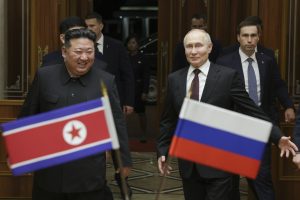Russian President Vladimir Putin’s visit to North Korea back in June created substantial unease in both the United States and among Washington’s allies. The notable presence of many Asian leaders, including South Korean President Yoon Suk-yeol, at the NATO anniversary celebrations in Washington last week is another reminder of the major reverberations of the “New Cold War” spreading from Europe into the Asia-Pacific.
The cozy relationship between Moscow and Pyongyang is hardly new. North Korea owes its very existence to decisions made in the Kremlin in the years immediately following World War II, of course. Notably, Putin visited North Korea in one of his first trips as Russia’s president and he has consistently over the last two decades called for U.N. sanctions against North Korea to be watered down. What is dramatically new, however, is that North Korea now has substantial leverage in this relationship since Russia is badly in need of North Korean munitions to continue its war against Ukraine. Reportedly, 11,000 containers of North Korean artillery shells, short-range missiles. and other war materials have been shipped to Russia since September 2023.
Nevertheless, it’s worth underlining that South Korea retains a very favorable balance of power over North Korea in almost all respects. South Korea has double the population and its economy is almost 60 times larger than North Korea’s. South Korea has much more technologically sophisticated conventional forces in all the major domains of military power: on land, in the air, at sea, as well as with respect to information and drone capabilities. In addition, Seoul’s very close alliance ties to both Washington and Tokyo ensure it remains in an unassailable position. Nor should we discount South Korea’s immense “soft power,” not least K-pop. This and other dynamic cultural strengths in Seoul’s favor ironically could prove most threatening to Pyongyang over the long term.
North Korea continues to improve its nuclear capabilities, including intercontinental ballistic missiles (ICBMs) to target the United States. Moreover, North Korea is also busy developing hypersonic weaponry, and even apparently has a program for a nuclear-armed unmanned underwater vehicle. Analysts generally agree that Pyongyang has pursued nuclear capabilities in large part to compensate for its other deficiencies in national power, whether economically or with respect to conventional military forces. Deterrence has proven to be relatively stable on the Korean Peninsula and experts believe that Pyongyang behaves rationally and would not resort to nuclear weapons use unless the regime was threatened.
China remains cautious and is not eager to divide Northeast Asia into two competing blocs. At this point, Beijing seems quite willing to see Moscow and Pyongyang cooperate more extensively, particularly as this could create additional challenges for Washington’s Indo-Pacific strategy. At the same time, China has not indicated any serious inclination to further institutionalize its ties with North Korea and Russia, recognizing the destabilizing nature of such a geopolitical move.
Both North Korea and Russia will gain substantially from their growing synergistic relationship, but this important linkage still has limits and the threat should not be exaggerated. As North Korea feeds Russia’s huge appetite for munitions, the heretofore isolated country will benefit in numerous ways – both in terms of basic goods like food and fuel, but also probably with respect to military capabilities in both the critical space and undersea domains, for example. At this point, it’s no exaggeration to say that Kim Jong Un is one of the biggest “winners” of the Ukraine tragedy. Still, it’s unlikely that North Korea would receive assistance with either nuclear weapons or related delivery systems.
As to whether North Korea is considering sending “volunteers” into combat in Ukraine, that would unquestionably signify an escalation of the war. Such a move, however, would likely be small in scale and intended chiefly to be symmetrical with European contingents (e.g. France) that might now be operating in Ukraine, rather than as a battlefield “game-changer.”
In the end, enhanced Russia-North Korea ties should not come as a surprise. It is logical for two countries under enormous strategic and economic pressures from the West to partner closely and seek for mutual gains. While Washington should continue to modernize the South Korea-U.S. alliance and to prod forward the Japan-South Korea security relationship, there are nevertheless opportunities for greater realism and restraint to ease tensions. The various minilaterals, whether the Quad or AUKUS or the still-nascent tripartite agreements between Tokyo, Seoul, and Washington should go forward, but only at a measured pace.
NATO, meanwhile, should not be given a robust agenda in the Asia-Pacific, since this is unnecessarily provocative. Indeed, Seoul’s robust support for Ukraine and Yoon’s early enthusiasm for NATO logically forms one major driver for the ever-tightening Russia-North Korea strategic partnership, even if these moves have proven extremely lucrative for South Korean arms manufacturers.
Also, the United States should continue and even elevate its engagement with China. At the same time, it is well past time for Washington to activate direct and continuous diplomatic channels with the Kremlin in order to try to negotiate an end to the catastrophic Ukraine War, while working simultaneously to reduce tensions on the Korean Peninsula as well.

































